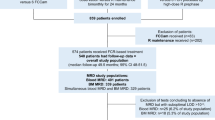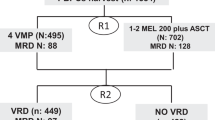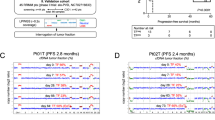Abstract
Although current treatments can induce clinical complete remissions in the vast majority of patients with indolent lymphoma, most of them actually relapse, because of the persistence of residual tumor cells which are undetectable using conventional diagnostic procedures. Polymerase chain reaction (PCR)-based methods are increasingly used for minimal residual disease detection (MRD), and provide useful prognostic information. In this review, current approaches for MRD detection in indolent lymphomas are summarized. In addition, the prognostic aspects of molecular monitoring after transplantation procedures are discussed. The experience accumulated over the past decade shows that PCR analysis has a prognostic impact in several therapeutic programs including conventional and high-dose regimens. Major advantages coming from the introduction of molecular monitoring in clinical programs have been: (1) a rapid evaluation of the anti-tumor activity of innovative treatments; and (2) an early identification of patients with a high-risk of disease recurrence.
This is a preview of subscription content, access via your institution
Access options
Subscribe to this journal
Receive 12 print issues and online access
$259.00 per year
only $21.58 per issue
Buy this article
- Purchase on Springer Link
- Instant access to full article PDF
Prices may be subject to local taxes which are calculated during checkout
Similar content being viewed by others
Author information
Authors and Affiliations
Rights and permissions
About this article
Cite this article
Corradini, P., Ladetto, M., Pileri, A. et al. Clinical relevance of minimal residual disease monitoring in non-Hodgkin’s lymphomas: a critical reappraisal of molecular strategies. Leukemia 13, 1691–1695 (1999). https://doi.org/10.1038/sj.leu.2401559
Received:
Accepted:
Published:
Issue Date:
DOI: https://doi.org/10.1038/sj.leu.2401559
Keywords
This article is cited by
-
Clinical practice guidelines for diagnosis, treatment, and follow-up of patients with mantle cell lymphoma. Recommendations from the GEL/TAMO Spanish Cooperative Group
Annals of Hematology (2013)
-
Rituximab purging and maintenance combined with auto-SCT: long-term molecular remissions and prolonged hypogammaglobulinemia in relapsed follicular lymphoma
Bone Marrow Transplantation (2009)
-
Prospective analysis of minimal bone marrow infiltration in pediatric Burkitt's lymphomas by long-distance polymerase chain reaction for t(8;14)(q24;q32)
Leukemia (2003)
-
Positron emission tomography with [18F]2-fluoro-D-2-deoxyglucose (FDG-PET) predicts relapse of malignant lymphoma after high-dose therapy with stem cell transplantation
Leukemia (2002)
-
High-dose ara-C with autologous peripheral blood progenitor cell support induces a marked progenitor cell mobilization: an indication for patients at risk for low mobilization
Bone Marrow Transplantation (2002)



